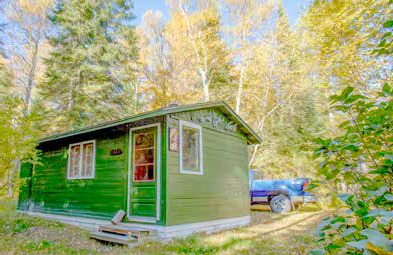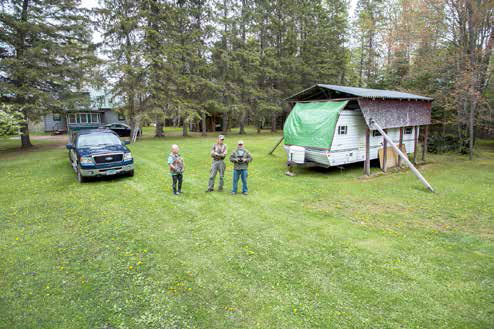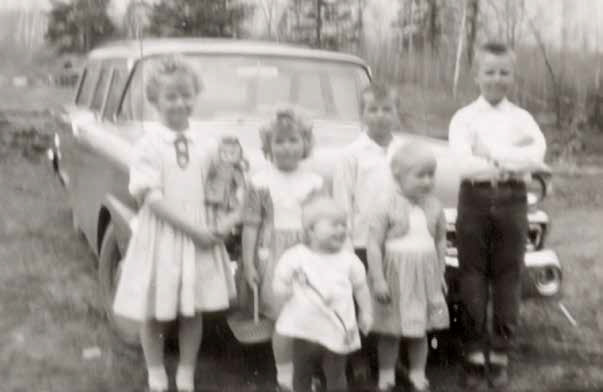Ten Cents a Dozen or Three Dozen for a Quarter
August 19, 1990 Dear Buck, I am having a problematic and moral problem in my own mind that I’m dealing with these days. It revolves around the economics of children. I’m not talking about the cost of raising kids and sending them to college, but the dollars distributed to my kids as spending money. There have been big changes since I grew up.
Part of the problem is that money has an inflated worth these days. What used to cost 10 cents now costs a buck 50. The other part of the problem is there is more money today to pass around. Too many of my kids’ friends seem to have an unlimited amount of cash to spend and it seems to come magically from nowhere.
As kids, we didn’t receive an allowance. As for some of our classmates who did, it seemed to me and my siblings like a scam. Do your weekly chores and by checking off on a chart that was taped to the side of the fridge, one would be paid 50 cents or a dollar for that week’s compliance. Scam because we did just as many – if not more - weekly chores and our folks never gave us a dime for the effort. Doing chores was an expected part of being in the family. Sometimes we would grouse and complain, but we knew that at best, it might delay washing the dishes or mowing the grass, but eventually the deed must be done. I learned early that skipping the complaining and getting to work right away would get me past the chore more quickly.
We never wanted for any of the necessities. Shelter, food and clothing were always in good stead. We didn’t have many luxuries and many of our “toys” and recreation were put together with alternatives we could find around the house, garage or property. I remember a toy gun I had one summer was supposed to mimic a flintlock rifle by finding a scrap piece of 1x2 board of the appropriate length and nailing a 1x4 on as a shoulder stock. Nails provided a trigger and sights, and a trashed set of distributer points acted as the hammer assembly on the side. Hey, pretend is pretend. One only has to carry the illusion a bit further to make it work!
The only money I remember Mom and Dad “giving” us was in August at County Fair time. They would pay for two rides of our choice and give us 50 cents each to spend as we wished. Another ride? Carny games? Cotton candy? Those would be our decisions! I can’t blame them. They weren’t stingy. We just didn’t have a lot of money. With six kids in the family, a 10 spot didn’t go very far. We never ate in a restaurant. Two or three times a year we would stop at the A&W in Nashwauk and have a burger and fries and dime mugs of great tasting root beer in frosty little mugs.
Not that there was all that much, living out in the country, to spend any money on. There were no department stores or arcades or online shopping. We lived 14 miles from Bovey, the nearest community of any size. We could walk on down to the Balsam Store and buy some comic books, candy or cards of the bubblegum baseball variety. In those days, I could go down to the store and buy a Nut Goody, Salted Nut Roll and a small bag of sunflower seeds for a quarter. What little money we had could go a long way. My only other expenditure at this time was for batteries for a transistor radio that I had saved a year to get. I would listen to Twins games by day and WLS out of Chicago or WDGY out of the Twin Cities at night. Unfortunately, too many times I would fall asleep listening to Dylan or The Beatles or Dave Clark Five and wake up in the morning with a dead 9-volt battery and must save for weeks to afford the 50 cents for a new one!
Not that my folks weren’t sympathetic to the meager financial needs of my brother and sisters and me. By not being able to afford to give us an allowance, they taught us how to respect money by working for it. They did this by way of our versions of the neighborhood lemonade stand.
In the summer, we had a big garden. There was always plenty of work – picking rocks, weeding and late in the season, harvesting. In the meantime, potatoes had to be hilled, beans and corn spaded as well. There were literally thousands of what we called “angleworms” living in the earth under our crops. Mom had the great idea that as she was spading, if we picked the worms, counted them and placed them in used soup cans and paper cups, fishermen might be willing to buy them. She painted a sign for us that we placed at the end of our driveway – “Angleworms – 10 cents a dozen or three dozen for a quarter.” She promised any money made would be “our” money – meaning kid’s money. It took a few weeks to build a following but eventually nary a day went by where we didn’t have two or three cars come up the driveway to purchase some “worms.” We kids did customer service with anyone who drove up to our house. The local resorts recommended us. We had repeat customers, not only during their summer’s stay, but in subsequent years as well. The take for a summer’s work - and we did this for a number of years - would amount to $60, $70 or $80. True to her word, we got all of the money, distributed evenly among us kids. A bit of socialism maybe, as we older ones did more than the younger, but we didn’t mind.
After Thanksgiving, Dad took his turn at our retail lessons. He would crank up (literally) the old F-12 tractor, hook up the trailer, load us kids onto the flatbed and head out into the woods to look for Christmas trees. There were thousands of balsam trees that looked good, smelled even better and stayed green for a fair amount of time because they were freshly harvested. He would cut several sizes, and we would load ‘em up. Back home we would trim them a bit, clean the dead leaves and grasses out of them and tag ‘em for sale. Prices ranged from $1.50 for the smallest to $3.50 for the larger ones. We would usually have one that was quite large that would carry a price tag of $5! Dad also had a specialty where he would cut a 10-inch diameter birch log into bases for very small, table sized trees. He would drill a hole in the center and wedge a 15-inch balsam into the hole. They went for $2.50. We would then transport them down to the Balsam Store where Toi and Helga Ahola would display them and sell them for us. Seldom was a year when we didn’t have to replenish the original supply. As with the worm business in the summer, we kids got all of the proceeds, divided equally among us. My parents wouldn’t “give” us money, but they were certainly integral in helping us to obtain a bit of spending change.
As we became “of age” - and by that, I mean about 12 – we would start to look outside of home to make some BIG money. I spent several summers being hired by loggers to “peel” popple. By bringing their wood to Blandin Paper Company with the bark already taken off, they would get another $3/cord for their efforts. For the extra dollars they would hire half a dozen of us local kids to use steel “peelers” made from the leaf springs of cars. My first summer I worked for the Demars Brothers Sawmill and pedaled my bike five miles each way to the acreage they were cutting. I made two cents for each 100-inch “stick” I debarked. Our goal each day was to make at least a hundred sticks. I felt like Scrooge McDuck swimming in piles of money!
Other years I helped some of the local farmers make hay. Some summers I would work for the township picking rocks or cutting brush along the roads maintained by Balsam Township. One sister worked for a bait shop counting out containers of leeches for customers. My sisters also cleaned cabins for resorts.
People of my grandparent’s age had a reputation for being frugal because of trying to get by during The Great Depression. Those of my parent’s age were frugal as well, having grown up through those difficult times, living with rationing during WWII and not yet ready to believe the advantages of a growing economy in the 50s and into the 60s. People of my generation are often tagged with not knowing the value of money because the world changed so much during our youth in the later 60s and 70s. Having more discretionary income and turning into a throwaway society made many less concerned about spending the dollars they had. Growing up in a household where the budget was tight, money was saved when we could. Nothing was thrown away – up to and including 3# coffee cans full of used nails. We were fortunate to carry on with at least a little respect for an economy of old.
Which brings me to my current dilemma. Financially, I’m much better off than my parents were. I can afford to be generous to my children. The question becomes; how do I navigate current economics while also instilling in them a respect for money as well as a deeper respect for where that money comes from? I’ve found no easy answer. There has to be some middle ground between how I grew up and just opening my wallet and letting the dollars fall out to be picked up by my kids for whatever they want. Buck, if you have any suggestions, I’m all ears!
I suppose there may be bigger concerns about raising kids as they get older. I have no experience in doing this, and I’m sure I’ll make some mistakes along the way. As I stumble through parenthood, my biggest hope is that I can set a compass in them that helps them be successful as a human being. Managing money is one aspect of that. I guess time will tell.
Hoops









